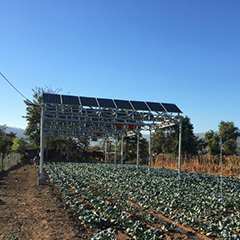Agrophotovoltaics (APV), a technology which combines the production of solar electricity and crops on the same land, has already been successfully demonstrated in pilot projects in several European countries. The Fraunhofer Institute for Solar Energy Systems ISE in cooperation with the Innovation Group “APV-Resola” have proven the feasibility of Agrophotovoltaics with a 194 kWp APV pilot system realized on a farm near Lake Constance in Germany. The project results showed that APV increases the land-use efficiency by 60 percent.
“The next step is to establish a proof of concept for the APV system technology in developing and threshold countries. Due to the higher levels of solar radiation in these countries, APV can make better use of its strengths. The potential is enormous,” says Stephan Schindele, project head of Agrophotovoltaics at Fraunhofer ISE, who is now focusing on transferring the technology to other climatic zones as well as other applications.
Fraunhofer ISE, together with Fraunhofer Chile, tested three 13 kWp APV systems in the Chilean communities of El Monte, Curacavi and Lampa. The Chilean APV pilot project ended in spring 2018 and was financially supported by the Santiago de Chile Metropolitan Region Government. In the project, investigations were carried out to determine which plants benefit from less radiation exposure, i.e. shading from the APV array. Sensors measured the meteorological data like solar radiation, humidity, soil moisture and ground temperature. The data was also used to optimize the on-site irrigation system. The operation of the three farms chosen for the project differed greatly: The first APV system was installed on a farm using very professional methods to grow broccoli and cauliflower. The solar electricity was used in the production process to clean, package and cool the produce. The second APV pilot system was installed on a family-run farm that grows herbs and other crops. The third system was set up in a remote region with a weak infrastructure. Access to the electricity grid is available, but electric service is quite irregular. The APV plant provided electricity for seven families, providing power to an incubator for hatching chicken eggs, among other things.
The three APV systems in Chile are the first of their kind in Latin America. The Fraunhofer Chile supports the scientific parts of the project, and the Fraunhofer Center for Systems Biotechnology CSB analyzes the agricultural aspects. The Fraunhofer Center for Solar Energy Technologies CSET addresses the energy-related and technical questions in close consultation with Fraunhofer ISE. Investigations involve adapting and optimizing the APV technology according to the specific climatic and economic conditions in Chile. The results of both the crop and solar power production are very positive. As a result, the APV research at Fraunhofer Chile shall be expanded thanks to the support of the local government. The three pilot plants will be monitored for three additional years, operating them as on-field labs. A long term plan involving different type of crops has been coordinated with the farmers, so it will be possible to test the concept with a large variety of products. “At the beginning of the project, there was a transfer of technology and know-how from Germany to Chile. In the meanwhile, the transfer is taking place at the same level in both directions. Fraunhofer ISE is profiting from the new experiences with APV in Chile and vice versa,” remarks Stephan Schindele.


























